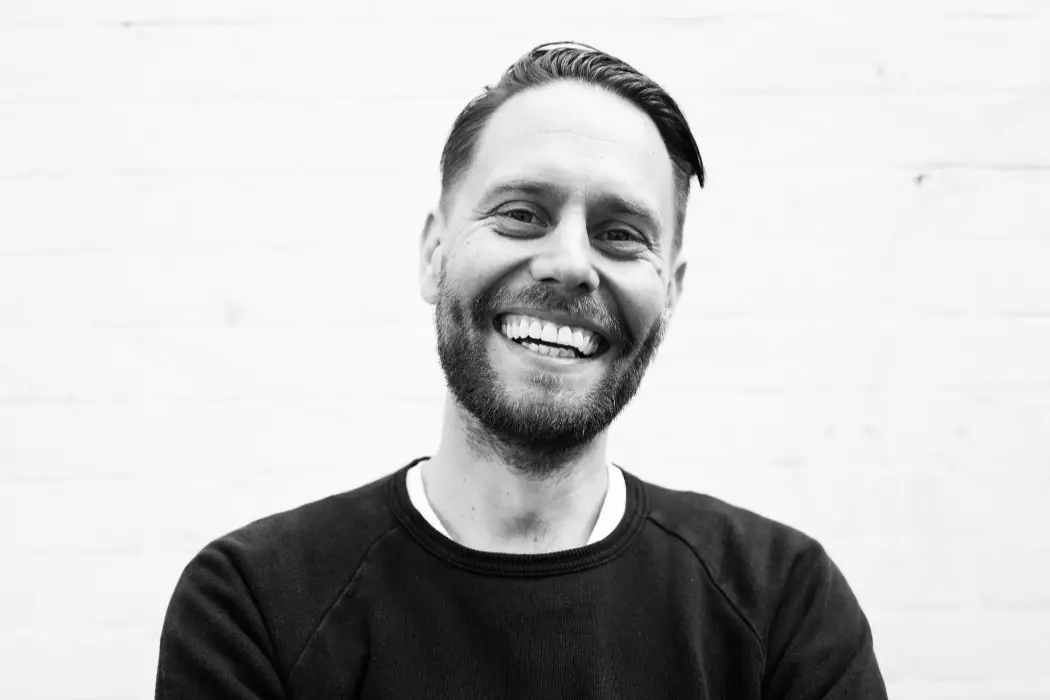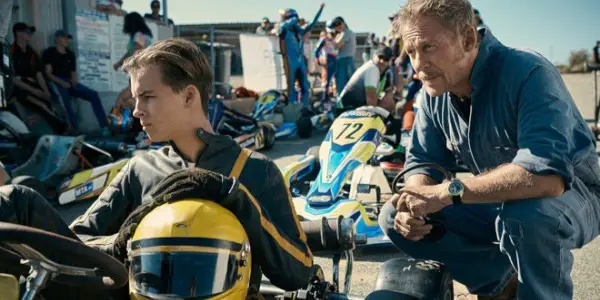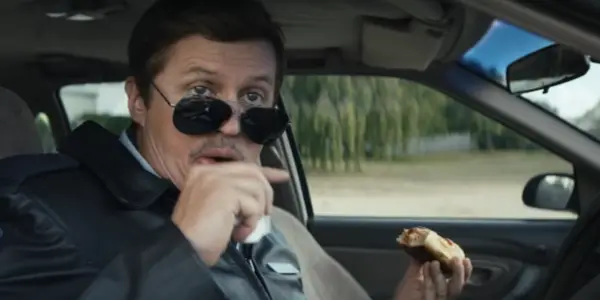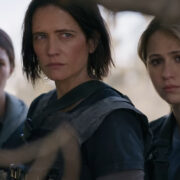Interview: Owen Trevor, Director of GO!

Alex is a 28 year-old West Australian who has a…
With Ride Like A Girl – the true story turned feel-good underdog sports drama about Michelle Payne, the first woman to win the Melbourne Cup – arriving late in 2019 to become the highest grossing Australian film of that year, a similarly affectionate, wholly true blue tale of dark horses winning big is welcome to a bright future; Owen Trevor’s go-karting family feature Go!
When I caught the film at its world premiere – a screening in beachside Busselton, the same sunny town it was shot in – I declared that Go! was an “imaginative rendering of competitive go-kart racing, which provides great entertainment for the whole family”. Established with the classic structure of The Karate Kid, Steve Worland’s charismatic follow-up to Paper Planes follows Jack (William Lodder), whose sudden shift to a new town after the tragic death of his father leads him into translating his grief and anxiety into the world of go-kart racing, where friend and foe alike support his challenging race to the top.
Ahead of Go!’s Australian theatrical release on January 16th, I had the chance to talk with Owen Trevor about the nature of the underdog sports story, how his experiences with Top Gear informed his approach to his feature-length debut and the influence of video games in his professional work.
How did you initially get involved with Go!
Owen Trevor: Jamie Hilton, one of the producers and the guy who started See Pictures (who made the film), we have known each other for a long time. We were at university together and we’d been talking about making a film for a long time and looked at various projects. I’ve been living and working overseas for a long time, but we’ve just always maintained contact and whenever he would be in LA we’d catch-up, cause I was living in LA in those days.
We just kept talking and talking and then eventually one day he said, okay, I’ve got an idea for you. He’s like: go karts. I was like eh, nah and he went, okay. We went off for six months and I did something else and he did something else. I then wrote back to him and said, you know, maybe there is something in that and then we started going from there. That was pretty much the initial starting point.

Why Go Karts?
Owen Trevor: Jamie’s idea was that it hadn’t been done very well. I’ve shot a lot of cars over the years and I’ve done a lot of comedy, so we thought we could do a fun take on it. Once I started thinking about it and thinking, all right, if I was going to make the family-ish film, what would I like it to be like? I thought, well, the ones that I grew up with, that’s what I want to do. I think there’s been two other movies set in the world of go-karting and they both suck.
Why do you think a film like this has never really been attempted properly before?
Owen Trevor: I think they’re very hard to make. It’s very hard to make them look cool. I think if anyone’s ever been to a go kart track, they’ll realize that when you stand on the side of the track, it’s not that exciting. It looks like a bunch of lawnmowers driving around on a track. I think that is one of the biggest challenges of making the film. One of the reasons why probably few people who’ve turned it down as an idea before or no one’s thought of it before because until you get in one and go, wow, this is going at 80 kilometres an hour and I’m like an inch off the road and there’s nothing around you.
It’s just you and four wheels and an engine. Then when you get in one, you experience it, you’re like, wow, okay, this is absolutely terrifying and like a genuine adrenaline rush. Senna said that it’s the purest form of motor racing. I think that once you start looking at it closer, there is something in there that’s visceral and amazing. That’s why basically in the film, I didn’t shoot anything from the side of the track. Almost everything is from the cart itself because until you’ve sat in one of those things, you don’t know what it’s like. You can see it on the driver’s faces that it is dynamic and amazing.
It seems to be Steve Worland’s knack of taking non-traditional sports and making them cinematic.
Owen Trevor: The funny thing about go-karting is it is genuinely where any formula one driver begins. It is the breeding ground for every motor racing superstar, so it’s not hard to take a leap from there. I think his challenge with Paper Planes was a bit greater, but with this film, Steve Worland is a car/motor racing nut job, like that is his life outside of filmmaking.
He adores and he watches every race, he knows everything, that’s very much his wheel house. I think it’s the only reason he agreed to do another family film, I don’t think he was going to do one after Paper Planes but then we offered him one about motor racing and he agreed.
How did you go about casting the film?
Owen Trevor: We went really wide, we knew we weren’t going to get anyone that anyone knew and I didn’t really want anyone that anyone knew. I wanted to find my own people and craft something from scratch. We were always going to have well-known people in the adult roles because that’s part of how you finance a film, but we really wanted to just start from scratch.
So we went really wide, we saw hundreds and hundreds and hundreds of kids nationwide. We saw some incredible talent that maybe just weren’t right or you know, didn’t nail it that day. There’s some other incredible talent in this country and we got really lucky in a way and I think I did a pretty good job. I think it was Peter Weir who said that 80% of directing is casting and having done a lot of work over the years – but nothing that’s feature length until now – I cannot agree with him more. I think that if you get that right, you don’t have to worry.
There was times where it was hard work and a scene wasn’t working or someone was a bit tired at times or whatever, but that’s normal. The kids just were exceptional and we really created an environment for them to become friends too. That made it really easy, I mean in some ways it made it harder because I had to remind people like Darius that he wasn’t friends with Cooper, who plays Dean.

It was really Anastasia Bampos who was the first actor where, we were seeing a lot of people and when we found her in Australia, I was like, I’ve got to make movie with this girl and she’s only going to be a kid for a little bit longer and someone’s going to cast her before us, you can just see it from the moment she walks in a room.
With William Loder, I adored Will from the very beginning and it took some convincing cause he’s very, very raw, and very instinctual. He’s not like Anastasia who comes in very prepared and organized, whereas Will comes in looking like a bit of a sleepy koala or something, but when he gets going, he’s a movie star. Steve Worland keeps saying, and I agree with him, that he just looks like a movie star and he has so much presence – when he turns it on, it’s undeniable.
What do you think has contributed to the enduring popularity of the underdog sports story? Do you have any favourites in particular?
Owen Trevor: I think it’s just classic storytelling, isn’t it? You take someone from a position, they discover something and they strive to achieve it. You know, I think it applies to not just sports stories, but any kind of hero’s journey in a way. I think sports films particularly, they are all effectively the same. And, you know, it doesn’t matter which sports, when you talk about, they all pretty much follow the same structure.
This is why we openly called out The Karate Kid reference in the film because it was like, we’re not gonna hide the fact that we were influenced by this. Sport to me, I love both cricket and rugby, it’s another version of drama. It’s real life, real live drama, it’s not scripted and I think that there’s something beautiful about that. It’s timeless, it’s never going to change. We’re going to keep saying millions of sports movies follow the exact same structure forever. My dream in a way is to hope that certain kids will have the same relationship with this film that I have with The Karate Kid.
Interestingly, I’m not a big sports movie fan. I don’t necessarily think it always translates brilliantly to cinema. I would call out Karate Kid and I know Steve is a big fan of both Tin Cup and Bull Durnam. I think that I often struggle with sports films because I think they don’t respect the sport enough and I think that there is a lack of authenticity to how they represent aspects of it. I think of Invictus for example, he [Clint Eastwood] doesn’t understand rugby, you can’t have a director telling a story like that and they don’t understand the fundamentals of the sport.
Whereas for example, Ron Howard did a pretty darn good job of Rush – even though he kind of nixed the visual style of Top Gear to do it, but he did a pretty good job of examining Formula One. I don’t know whether he’s a Formula One nut, but he obviously did his research and it feels very authentic and everything is very real and honest and respectful of the people, the fans of that sport. I think that’s the key thing, you’ve got to be respectful of them because if you don’t have them on board, then I think they’re going to tear the film to pieces.
How would you describe how your experience with Top Gear informed your work this film?
Owen Trevor: I don’t think the film itself – it didn’t – but I think that definitely my experience shooting vehicles allowed me to pull this off. It’s not a big budget movie and shooting vehicles and races is very time consuming and expensive and a difficult thing to do if you don’t know how to do it.
Top Gear taught me how to move quickly, particularly with that type of material, lots of objects moving in space. What I can take from the practical production of shooting vehicles, is the way to make them look exciting is that it’s always about finding the people inside it and the story.
It doesn’t matter how good it looks, you know with Top Gear, you have three idiots making people laugh and the audience is already bought into them a million episodes ago. So you don’t have to earn their trust, but you do have to keep them attached to their journey. I think that’s the biggest thing is that you realize when you look at that show, you actually analyze it, it’s about three mates just goofing around. I think that the story inside, keeping it attached to Jack’s journey is the key to Go!
Do you have any childhood memories or connections to the world of go kart racing?
Owen Trevor: Not really. It’s funny, I’m not an enormous car person. With Top Gear, I was brought on originally to work on the comedy and the drama of the show and you very quickly work out that you can’t really change that because that’s something that is driven by Jeremy and the guys, so I had to learn how to shoot cars. I don’t know a thing about cars, I can’t cite engine capacities or top speeds or anything like that. But I do know how to shoot them.
I think that they are very powerful, there’s a reason why they’re used so much in movies, whether it be a road movie or an action chase sequence or in racing movies. They are dynamic and exciting to see on screen. I watched John Wick 3 the other day and the way they use vehicles in that is really interesting. I think that cars are always going to be a part of cinema and they’re inextricably linked with them because they look great.
One of the most refreshing elements of the film for me was that despite the throw-back nature of the story, and the synth-heavy score and great jukebox soundtrack that drives the film, it’s still set in modern day. Was there ever the temptation to make the whole deal retro, or did that mix of styles to create a sense of timelessness appeal to you?
Owen Trevor: Yes. It’s something that I love playing around with in my advertising work. My work has a very eclectic, odd, weird style that allows me to somehow travel the world making ads and people seem to like it. It’s something that I wanted to bring to this and particularly with my cinematographer, the production designer, the costume, the wardrobe and even the hairstyles and then the sound design in the school.
I really wanted to explore that timelessness and create our own little world. Cause it is very collective and eclectic,so there is music in the 60s and haircuts from the early nineties and wardrobe from the 80s. I think also I wanted to just make it feel like you can even see from the very beginning, when we treated the Village Roadshow logo to make it look a bit like a VHS. That was really what I was going for and I’m glad you think it worked because it’s one of the things I’m most proud of.
Speaking to that, can you talk a bit about the film’s throwback score?
Owen Trevor: We worked with some incredible musicians and composers and music supervisors, and I really just said it needs to be the envelope that pulls together all of this other stuff that I’ve done. We shot it on vintage cameras, we lit it in a certain way, we framed it a certain way, I gave the actors particular haircuts, etc. I think that the music needed to give me permission for all of that. We played around with some 80’s stuff, but you know, there’s 60’s reference – it opens with the 60s folk track and it closes with a very modern kind of dreamy pop track.
We played around with that a lot. Then we brought in some strings and some real minimalist piano stuff with Brendan Woithe, the composer who did most of the score. He and I have a huge love of a minimalist piano music and modern piano work, so we used a lot of that Nils Frahm influence to create the emotional underpinnings of Jack’s journey.

One thing I noticed when watching Go was the pervasive theme that at every point in the film, somebody is either a mentor or a protege, with the roles shifting constantly. Was this something you noticed when putting the film together?
Owen Trevor: Yeah, definitely. I mean, that was a very deliberate thing that Steve wrote into the script. One of his favourite tropes is having kids teach adults how to behave like adults. It’s a very effective tool, particularly in the Dan Wyllie relationship. You know, I think that there’s a lot of humour in that and we get a lot of laughs out of that. I mean the whole film is ultimately about him [Jack] losing his father. I think that those different mentors and those different roles that each character plays within each other’s life is a deliberate thing. Playing with those dynamics in the relation to each other was one of the things that we really looked at.
I think between the progressive nature of the plot and the way it’s handled visually, there’s quite a video game sensibility to the picture, which I felt recalled your work on Street Fighter Legacy, are you a big video game guy, and if so, do you feel like it’s influenced how you tell stories?
Owen Trevor: No-one has ever asked this question, so I’m really pleased. This is a very unique take. Yes, I am, I’m not so much these days but when I was growing up, yes, very much so. Street Fight Legacy is an interesting one to pull, as I think what it is, my visual style or my visual aesthetic that I am drawn to, people often cite that I’m influenced by Wes Anderson – and I am, but I am probably more influenced by that 80’s-era of cinema.
I love formalism. I love structure and shape within the frame and graphic compositions. You can see throughout the film, I very regularly stage everyone almost on the proscenium. It’s a visual style that I just adore. It’s a look and feel that I like and I think that it does have parallels to video games and particularly the original platform video games that I was playing when I was a kid like Street Fighter or Rolling Thunder.
We can even go into earlier shoot-em-ups like Goldeneye and Wolfenstein 3D that is very similar to say how I framed a lot of the car stuff. I like that very composed, considered structured frame, which a lot of those early video games had and I haven’t consciously realized that before. So you pointed out something I think quite interesting is that, yeah, that probably has influenced my development, my work over all things – and not just this one.
Film Inquiry thanks Owen Trevor for taking to time to talk with us.
Go! will be hitting Australian cinemas on January 16th 2020.
Does content like this matter to you?
Become a Member and support film journalism. Unlock access to all of Film Inquiry`s great articles. Join a community of like-minded readers who are passionate about cinema - get access to our private members Network, give back to independent filmmakers, and more.












